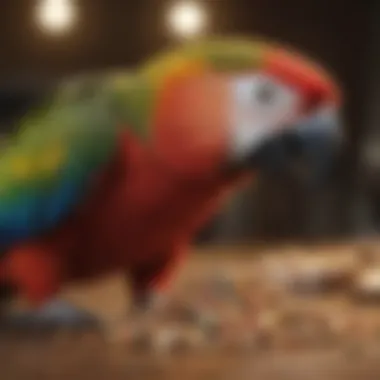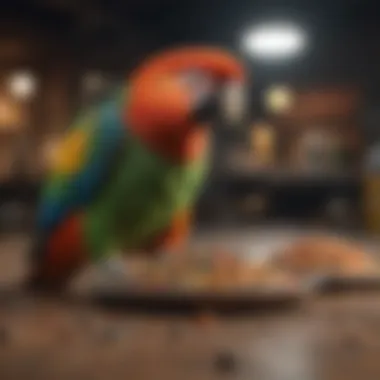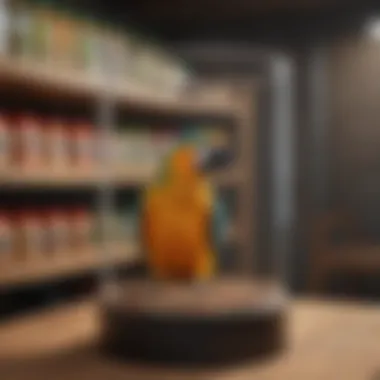Best Parrot Pellet Food: A Guide for Pet Owners


Intro
Parrots are intelligent and vibrant creatures that require a specific diet to thrive. One popular option among pet owners is parrot pellet food. This comprehensive guide aims to provide vital insights into the various aspects of parrot pellet food, including nutritional importance, product options, and choosing the right diet for your feathered companion. Understanding the needs of your pet is essential for fostering their health and longevity.
Understanding Your Pet
Pet Behavior Basics
Knowing parrot behavior is the first step in proper care. Parrots are social animals; they thrive on interaction with their owners and other birds. Their vocalizations can indicate their mood. For instance, a loud squawking may signify excitement or attention-seeking, while soft chirping might reflect contentment. Understanding these behaviors can enhance your relationship with your pet.
Common Breed Characteristics
Different parrot species possess unique characteristics that affect their dietary needs. For example, larger birds like the Macaw require more energy and thus a higher caloric diet than smaller species, such as Budgerigars. Knowledge of these traits helps you to tailor their pellet food choices.
Species-Specific Needs
Each parrot species has specific dietary requirements that should be considered. African Grey Parrots, for instance, need more calcium and vitamin D, while Amazon Parrots often require some additional fat content. Selecting the right pellet food involves understanding these requirements.
Pet Care and Maintenance
Feeding Guidelines
Establishing a feeding routine is essential for your parrot's health. Pellets should comprise about 60-80% of their diet, with the remainder consisting of fresh fruits, vegetables, and occasional seeds or nuts. When selecting a pellet, choose one that matches your parrot's species and age. Look for high-quality brands such as Harrisons or Kaytee, known for their balanced nutrition.
Grooming Essentials
Regular grooming is vital for parrot health. This includes routine beak, nail, and feather care. Beaks may need to be trimmed if they become overly sharp, while nails should be clipped to prevent injury. Bathing is also necessary to keep feathers in top condition.
Hygiene Practices
Maintaining a clean environment is crucial for preventing illnesses. Clean food and water dishes daily. Regularly inspect and clean the cage to remove waste and debris. A tidy habitat supports overall well-being.
Training and Development
Basic Commands and Skills
Training your parrot involves teaching basic commands such as
Understanding Parrot Nutrition
Understanding parrot nutrition is essential for the overall health and well-being of these intelligent birds. It is not just about providing food, but rather ensuring that the dietary needs are met through balanced nutrition. A well-planned diet contributes to longevity, vibrant feathers, and an active lifestyle. Educated pet owners must take the time to comprehend the components of a parrot's diet to avoid health issues down the line.
The Role of Diet in Parrot Health
Diet plays a pivotal role in maintaining parrot health. A nutritious diet influences growth, feather quality, and immune system function. It directly impacts their mood and behavior. Parrots that consume a balanced diet tend to show fewer signs of stress and are more resilient against diseases. Regularly evaluating diet can alert owners to any deficiencies that may arise, helping to prevent serious health problems.
Key Nutritional Components for Parrots
Proteins
Proteins are fundamental components of a parrot's diet. They contribute to tissue building and repair, immunity, and overall growth. A key characteristic of proteins is their ability to provide essential amino acids that parrots cannot synthesize. This makes them a beneficial choice for ensuring a healthy avian diet. Including adequate protein helps prevent stunted growth and promotes vibrant plumage. However, too much protein can lead to issues, such as kidney strain, which owners should avoid.
Vitamins
Vitamins are crucial for parrot health as they play various roles, from metabolism to bone structure. Their significant characteristic is that they support numerous bodily functions. For example, Vitamin A aids in vision and skin health. A well-rounded diet containing the right vitamins is essential for preventing deficiencies. Failing to meet Vitamin needs can result in severe health problems. However, supplementation must be approached with caution, as excess can lead to toxicity.
Minerals


Minerals are also vital for parrot nutrition. They contribute to bone strength and various physiological processes. A noteworthy characteristic of minerals is their role in enzyme function and nerve transmission. Including minerals in pellet food ensures a balanced diet and helps avoid conditions like feather plucking, which can be a sign of mineral deficiency. However, too high levels of certain minerals, like calcium, can lead to health concerns such as hypercalcemia.
Fiber
Fiber is an important aspect, as it aids in digestion and overall gut health. The key characteristic of fiber is its role in promoting healthy gut flora, which is essential in preventing digestive disorders. While pellets often contain some fiber, fresh fruits and vegetables can supplement this component efficiently. A high fiber diet helps regulate weight and encourages natural foraging behaviors. It is crucial to avoid excessive low-fiber diets as they may lead to obesity and other health issues.
The Importance of Variety in Diet
Prolusion to Parrot Pellets
Understanding parrot pellets is crucial for any informed bird owner. These formulations offer a balanced diet that can help meet the specific nutritional needs of parrots. Unlike seeds, pellets are designed to provide essential nutrients in a convenient and consistent form. This section will shed light on the nature of parrot pellets and trace their development over the years.
What Are Parrot Pellets?
Parrot pellets are a type of formulated bird food designed to supply a well-rounded diet for parrots. They come in various shapes, sizes, and flavors. The primary aim of pellets is to simplify feeding while ensuring that birds receive all necessary nutrients.
Most pellets contain a mixture of grains, seeds, vitamins, and minerals that aim to replicate the natural diet of parrots. They are usually scientifically formulated to prevent the deficiencies seen in seed-based diets. Pellets offer a range of dietary richness while removing the guesswork about nutrient intake. This makes them attractive to both pet owners and avian veterinarians.
History and Development of Pellet Food
The evolution of parrot pellets began in the late 20th century when an increased understanding of avian nutrition began to develop. Prior to this, many parrots were primarily fed seeds, which often led to various health issues. A focus on bird welfare prompted researchers and enthusiasts to explore better feeding options.
Early pellet formulations were basic and often lacked the intricacies found in modern products. As research advanced, manufacturers began to incorporate a wider variety of ingredients. They sought to create diets that not only met nutritional standards but also appealed to birds' preferences. This led to the emergence of innovative brands that are now recognized for their quality. Today, the market offers a plethora of pellet choices, ensuring parrot owners can find options suitable for the unique needs of their pet.
Evaluating Parrot Pellet Brands
Evaluating parrot pellet brands is a crucial part of understanding what your feathered friend needs for optimum health. The choice of food can significantly impact a parrot's well-being. Different brands offer various formulas that cater to diverse nutrition requirements. Knowing how to assess these options allows pet owners to make informed decisions. The focus here is on ingredient quality, brand reputation, and the nutritional balance of the products offered. Evaluating also helps identify the specific needs of individual parrots related to species and dietary restrictions.
Top Brands for Parrot Pellets
Brand A
Brand A is renowned for its commitment to high-quality ingredients. It specializes in providing a balanced diet that meets the nutritional needs of various parrot species. A key characteristic of Brand A is its use of natural fruits and vegetables, which enhances the flavor and nutritional content. This brand also emphasizes whole grains, ensuring a diet that is both healthy and appealing.
One unique feature of Brand A is their focus on formulating specific blends for different species. This approach can be beneficial because it recognizes the distinct dietary needs of each type of parrot. However, it is essential to be aware that some users have reported issues with packaging, stating that it might not be as robust against pests.
Brand B
Brand B sets itself apart by incorporating probiotic ingredients that support digestive health. This characteristic makes it a popular choice among parrot owners who are concerned about the bacteria in their pet’s gut. The inclusion of these probiotics can help maintain good digestion and overall health.
A unique feature of Brand B is its focus on minimizing artificial additives. This reduces the risk of health issues related to synthetic ingredients. That said, some customers note that the pellets can be less appealing to picky eaters, thus requiring additional effort to transition parrots onto this diet.
Brand
Brand C is recognized for its budget-friendly alternatives without compromising quality. This brand often appeals to a broader range of pet owners. It includes essential nutrients while offering a variety of flavors. The key characteristic here is its affordability, making it accessible for everyone.
One unique aspect of Brand C is its innovative packaging that maintains freshness longer, enabling a longer shelf life. An advantage of this brand is its extensive marketing and consumer education efforts, which help pet owners understand the necessary nutrition. However, a notable concern is its sometimes inconsistent availability, which can complicate long-term feeding plans for pet owners.
Ingredient Quality Analysis
When it comes to parrot pellets, ingredient quality is paramount. High-quality ingredients often ensure a well-rounded diet that supports long-term health. When choosing pellets, look for brands that list whole foods at the top of their ingredient list.
Key elements to consider include:
- Natural vs. Artificial Ingredients: Opt for pellets with minimal artificial additives.
- Whole Grains and Seeds: These are vital for providing necessary fiber and vitamins.
- Nutritional Additives: Enhanced vitamins and minerals can cater to specific dietary needs.
Transparency in sourcing and processing is also important. Brands that are open about where their ingredients come from tend to be more reliable.


Price vs.
Quality Considerations The balance between price and quality often perplexes pet owners. While lower-priced pellets can be tempting, they may lack vital nutrients that promote health. High-quality pellets usually come at a higher price point, but they often offer better ingredient profiles and nutritional value.
Key considerations include:
- Long-Term Cost: Investing in better quality food can lead to fewer health issues, saving money over time.
- Nutritional Density: Look for pellets that offer more nutrition per serving.
- Brand Reputation: Check reviews and customer feedback to gauge overall satisfaction and effectiveness.
Selecting the Best Parrot Pellet Food
Choosing the right parrot pellet food is of utmost importance for the health and well-being of your feathered buddy. Each parrot has unique dietary requirements, influenced by factors such as species, age, and health status. Selecting the appropriate pellets ensures that your pet receives the necessary nutrients to thrive.
Identifying Your Parrot's Needs
Species
Understanding the different species of parrots is essential for selecting the right food. Each species has distinct dietary needs. For example, a Macaw may require more fats and proteins than a Budgerigar, which leans towards a lower fat diet. The unique features of each species dictate the kind of pellets that should be prioritized. By catering to these specifics, pet owners can ensure their parrots receive a balanced and healthy diet that suits their natural behaviors and nutritional requirements.
Age
The age of a parrot also plays a critical role in dietary selection. Young parrots often need nutrient-rich food to support their growth, while older parrots may require a diet lower in certain calories to prevent obesity. Important also is that older parrots might have different digestive capabilities. This age consideration allows pet owners to provide a tailored diet, ensuring optimal health across their pet's lifespan.
Health Status
Health status is a vital factor when determining parrot food. Certain dietary restrictions may apply if a parrot is recovering from illness or has a chronic health condition like liver disease. In such cases, specialized pellets with lower fat content or added vitamins may be needed. The awareness of a bird's health status will guide owners toward making informed choices that can greatly impact long-term health. Ensuring compliance with this can foster improved overall vitality.
Reading and Understanding Labels
Understanding food labels on parrot pellets is crucial. Labels provide important information about the nutritional composition, including protein, fat, and vitamin content. They may also list any artificial ingredients or preservatives that could be harmful. Careful scrutiny of labels can help pet owners avoid potential allergens and select products with high-quality ingredients.
Transitioning to Pellet Diets
Transitioning a parrot from seeds or other food types to a pellet-based diet must be conducted with care. Gradually introducing pellets while mixing them with familiar foods can help ease the transition. Owners should observe their birds, monitoring for preferences and ensuring that their new diet is well accepted. Patience is paramount, as some birds may take longer to adapt than others. Ensuring a smooth transition will help maintain the parrot’s overall well-being during dietary changes.
Common Misconceptions About Pellet Food
The topic of common misconceptions about pellet food is essential in understanding the nuances surrounding parrot nutrition. Many pet owners have a limited perspective on what constitutes a healthy diet for their feathered companions. Misunderstandings can lead to poor dietary choices, affecting the overall health of parrots. This section aims to clarify these misconceptions and highlight the importance of an informed approach.
Pellets vs.
Seeds
One prevalent misconception is the belief that seeds are an adequate long-term diet for parrots, whereas pellets are not. Seeds might provide some nutritional value, but they often lack the balanced dietary components necessary for optimal parrot health. Pellets are formulated to meet the specific needs of parrots, usually containing essential vitamins, minerals, and a proper ratio of protein and carbohydrates.
• Nutritional Balance: Pellets often provide a complete diet, avoiding deficiencies typical in seed-based diets.
• Health Risks: Relying solely on seeds can lead to obesity and other health issues due to their high-fat content.
• Digestive Health: Pellets can improve digestion by containing quality fiber, helping to regulate bowel health.
It is crucial to understand that feeding a parrot a diet primarily based on seeds can lead to long-term health problems that pellets are designed to prevent.
Myths Surrounding Nutritional Value
Another set of myths concerns the nutritional value of pellets. Many pet owners mistakenly believe that all pellets are the same and provide inadequate nutrition. This myth disregards the differences in formulation and quality among various brands.
Potential Health Issues Related to Pellets


Understanding potential health issues related to parrot pellets is crucial for all parrot owners. While pellets are formulated to provide a balanced diet, they can pose specific risks. Being informed about these risks helps to ensure that your parrot thrives. Health issues can result from improper diet choices, underscoring the importance of being vigilant and observant.
Nutritional Deficiencies
Nutritional deficiencies represent a significant concern when relying solely on pellet diets. Pellets are designed to meet the essential dietary needs of parrots, yet not all formulations are equal. Certain brands may lack specific nutrients, leading to deficiencies over time.
Essential vitamins and minerals such as vitamin A, calcium, and phosphorus are critical for parrot health. If pellets don’t provide these in sufficient quantities, your parrot may experience health setbacks. Symptoms can include feather plucking, lethargy, or even more severe issues like liver disease. Therefore, it is vital to regularly evaluate the nutritional content of the food you are providing to ensure it meets all of your parrot's needs. Look for labels that detail their ingredients clearly.
It is advisable to consult with avian veterinarians to understand the specific needs of your parrot. Regular blood tests can help identify potential deficiencies before they lead to serious health problems.
Obesity Concerns
Obesity is an increasingly common issue among companion parrots, especially those consuming high-calorie pellets. Pellets can be energy-dense and may lead to overconsumption if not moderated. This issue is particularly pronounced in inactive or sedentary parrots.
An overweight parrot may suffer from various health problems, including heart disease and diabetes. These conditions can severely impact their quality of life and longevity. To reduce the risk of obesity, it’s essential to encourage physical activity alongside a balanced diet. Providing opportunities for play and exercise is as important as the food itself.
Additionally, monitoring portion sizes can mitigate the risks associated with calorie-dense pelleted food. Many pet owners may overlook this area, leading to unintended consequences. It is recommended to measure the daily ration of pellets based on the parrot's weight and activity level. Offering a diverse diet with fresh fruits and vegetables can also help control weight while ensuring they receive adequate nutrients.
Integrating Non-Pellet Foods
In the pursuit of optimal parrot health, integrating non-pellet foods into a parrot's diet emerges as a significant consideration. While pellets are formulated to meet your parrot's specific nutritional needs, they should not be the sole component of their diet. Instead, non-pellet foods provide essential variety, enhancing not just the palatability of the diet, but also ensuring a broader array of nutrients.
Supplementing Pellets with Fresh Foods
Supplementing pellets with fresh foods is crucial for enriching a parrot's diet. Fresh fruits and vegetables are not only appealing but also deliver vitamins and minerals that pellets may lack. Parrots benefit from a diverse diet that includes options like leafy greens, carrots, apples, and bell peppers. The textures and flavors of these foods stimulate parrot curiosity and physical exercise, both fundamental for mental health.
For example:
- Leafy Greens: Spinach and kale provide antioxidants and calcium.
- Fruits: Berries and bananas offer fiber and a dose of sweetness.
- Vegetables: Carrots and sweet potatoes are excellent for beta-carotene.
However, it is essential to wash these foods thoroughly. Avoid avocado, onion, and chocolate, as they are toxic to parrots. Always introduce new foods gradually, observing for any signs of digestive upset.
Occasional Treats and Their Importance
Occasional treats can play a significant role in a parrot's overall diet. Treats are not just for enjoyment; they can be useful motivational tools during training or bonding exercises. Special treats such as nuts, seeds, or even cooked grains add variety to the diet. However, moderation is key.
Important: Treats should be limited to about 10% of a parrot's daily caloric intake to prevent obesity. Excess calories can lead to health concerns over time.
When selecting treats, consider:
- Natural Options: Choose unsweetened, unflavored options without additives.
- Frequency: It should remain an occasional reward, not a regular staple like pellets or fresh foods.
- Health Value: Opt for treats that provide some nutritional benefits.
End
The conclusion of this article serves to reinforce the vital knowledge pet owners need regarding optimal parrot nutrition. Understanding the nutritional requirements and the role of parrot pellets in a balanced diet is essential for the health and longevity of these birds. Emphasizing careful selection, it is crucial to consider your parrot's specific needs relating to species, age, and health status. These considerations help mitigate potential health issues that can arise from improper diets.
Moreover, integrating variety by including fresh foods alongside pellets adds necessary diversity to a parrot's diet. This blend supports emotional well-being, as it encourages foraging behaviors and prevents boredom. A thoughtful approach to concluding this guide also encourages owners to reassess their feeding choices based on current recommendations and emerging research in avian nutrition.
Recap of Key Points
Parrots require a well-balanced diet to maintain health. Here are the main takeaways from our discussion:
- Nutritional Significance: Pellets offer a concentrated source of nutrients essential for parrot health.
- Ingredient Quality: Not all pellets are equal; selecting high-quality brands is fundamental.
- Diversity is Crucial: Incorporating fresh foods and treats provides enjoyment and additional vitamins.
- Transitioning Carefully: Moving to a pellet diet should be gradual to ensure acceptance and adjust to changes.
This recap emphasizes how an educated approach and a commitment to quality diet choices significantly impact the well-being of parrots.
Final Thoughts on Choosing Parrot Pellets
Selecting the right parrot pellets is not merely about picking any brand off the shelf. It involves understanding your individual bird’s nutritional needs. First, familiarizing yourself with the various brands such as Harrison's Bird Foods, Kaytee, and Zupreem can expand your options while helping to identify which ones align with your parrot's specific dietary requirements.
Keep in mind that consulting with avian veterinarians can provide personalized advice tailored to your pet's health. As new products enter the market and our understanding of parrot nutrition evolves, continuous education is essential for all parrot owners.
"An informed pet owner is key to a healthy parrot."
In summary, making educated feeding choices today promotes a flourishing and vibrant life for your feathered companion tomorrow.







